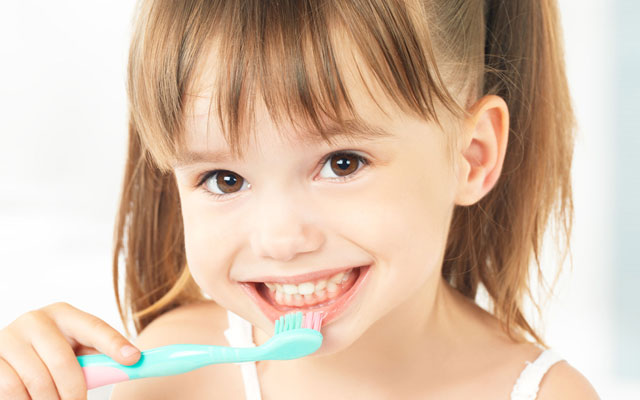10 Tips for Tiny Teeth

Kids usually take an interest in their teeth after learning that the Tooth Fairy could be winging by for a visit. But for parents, caring for children’s teeth starts early—long before baby teeth make their first appearance. These tips can help you keep your child’s teeth healthy and trouble free, from birth through adolescence.
- Wipe your baby’s gums clean.
Even though your infant doesn’t have teeth yet, it’s still important to keep his or her mouth clean. After each feeding, wipe your child’s gums gently with a clean, damp cloth or gauze pad. - Keep the bottle out of the crib.
If children often drink milk, fruit juice, or other liquids that contain sugar before falling asleep, it can hurt their teeth and lead to cavities. - Start brushing as soon as the first tooth comes in.
After your baby’s first tooth comes in, start brushing his or her teeth with a small, soft toothbrush, preferably one made specifically for infants. Use a fluoride-free toothpaste until your child is two, unless your child’s dentist recommends otherwise. - Mark your baby’s first birthday with a trip to the dentist.
Dentists recommend that you bring your baby to the dentist by his or her first birthday, or within six months after his or her first tooth, whichever comes first. During this visit, you’ll be able to talk with the dentist about how to keep your child’s teeth heathy, and establish a “dental home” for your child. - Use pea-sized amount of toothpaste.
For young children, put the toothpaste on the brush yourself and brush their teeth yourself (or watch as they brush). Teach your child to spit out the toothpaste rather than swallow it. - Keep the floss handy.
Floss your child’s teeth once a day as soon as the baby teeth touch. If you have trouble reaching your child’s back teeth, use a floss stick. - Find out if your water contains fluoride.
Many towns add fluoride to the local water supply because it helps keep teeth healthy. Most RI towns have fluoridated water, but contact your local water supply board to be sure or get your well water tested. If there isn’t fluoride in the water, your dentist may prescribe dietary supplements or treatments for your child. - Don’t worry about thumb sucking while your child has baby teeth.
Thumb sucking (and the use of a pacifier) is usually fine for babies and young children. Sucking can become a problem, however, as the permanent teeth come in. If your child continues to suck his or her thumb or use a pacifier after about age four, your dentist may have suggestions to help. - Visit the dentist every six months.
Kids (and adults) should go to the dentist for a cleaning twice a year. This helps remove plaque buildup and stops small problems from turning into bigger ones. - Help your child eat a healthy diet.
Cavities are often caused by sugary or starchy foods that stick to the teeth, such as chewy candy, lollipops, and chips. It’s a good idea to limit these snack foods. Dentists also recommend that you save sugary and sticky foods for mealtimes when they’ll be washed away by other foods and drinks.
Looking for dental coverage? Getting a Blue Cross Dental plan is fast and easy.